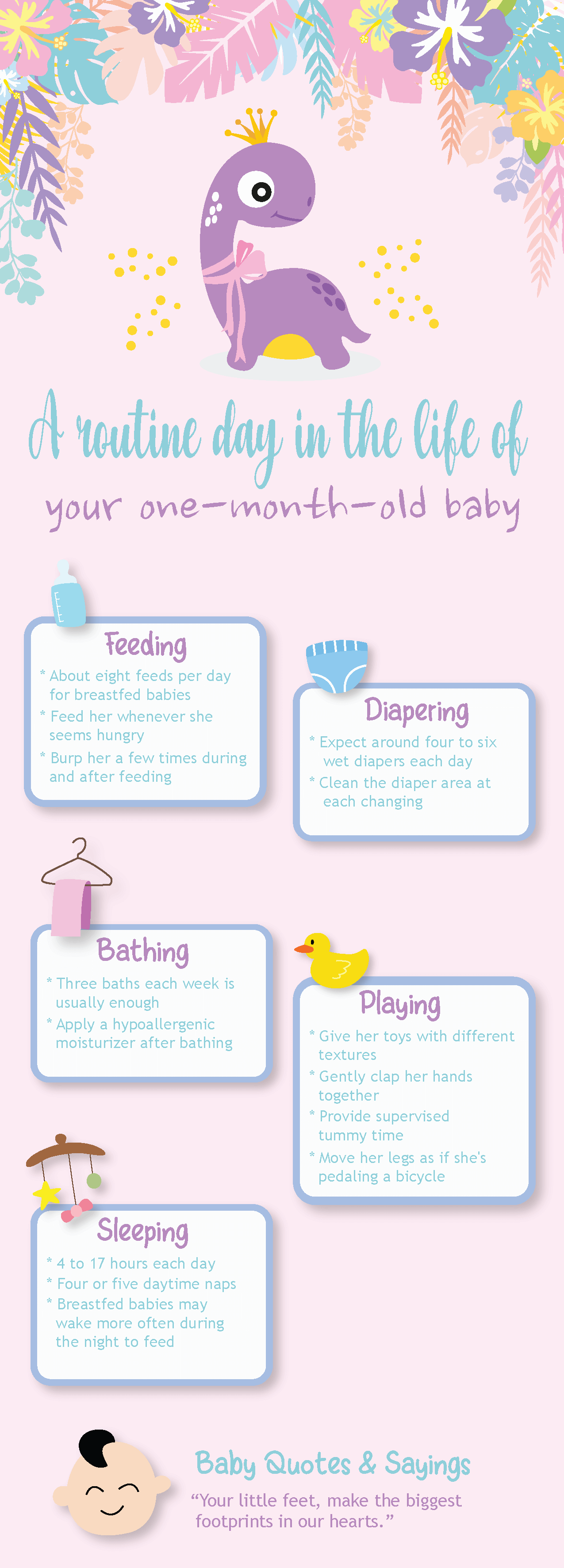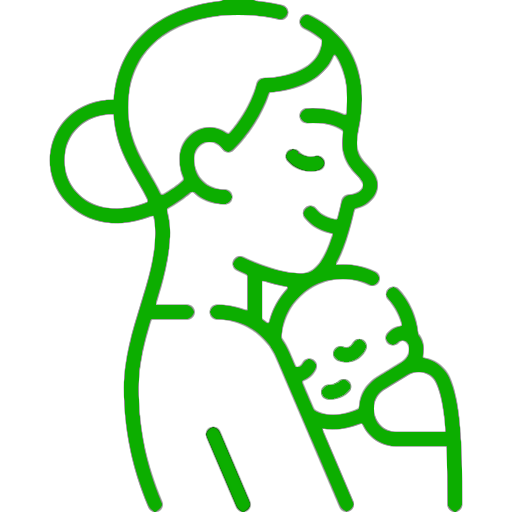your 1-month-old baby establishing(Chapter 2) grow and develop quickly, and your baby will keep you on your toes in weeks five, six, seven, and eight. To help you feel more prepared, we’ll go over some common milestones for a 1-month-old infant, explain what you need to know about feeding and sleeping during this period and alert you to any potential problems.

How Much Sleep Should a One-Month-Old Baby Get?
By 4 weeks of age, newborns sleep 14 to 17 hours per day, including five daytime naps. With luck, your baby will begin to sleep for greater periods of time nightly around the age of 6 weeks. You may be exhausted, but there is light at the end of the tunnel: Your baby’s natural biological sleep cycle will emerge over time, but for the time being, it’s crucial to let your baby to sleep whenever she feels weary. This is when she will receive the most rest, and remember to always lay your baby down on her back.
Setting your infant up for excellent sleep habits from a young age will benefit you greatly later on. You can already begin to build a bedtime routine, and if your baby screams when you put her down, calm her by rocking her, playing relaxing music, or quietly chatting to her. Feel free to pick her up for a few minutes and then return her to the crib when she appears calmer.
A Day in Your Baby’s Life
Here’s an example of a 1-month-old baby’s routine, which includes washing, sleeping, feeding, and playing:
Early Hygiene Practices
You may have gotten the hang of it already, and your baby may look forward to bathtime fun, but if not, watch these short videos on how to bathe your baby and other relevant topics.
A Day in the Life of Your Baby
Every baby is different, but here’s a glimpse of what a typical day could look like with your baby.

When Is Crying Colic Caused by Your Baby?
All babies scream from time to time, but crying can be a sign of a disorder known as colic.
- Your infant appears to cry for hours each evening
- The crying is loud and high-pitched.
- The sobbing appears to be for no apparent reason.
- You have a difficult time soothing him while he is sobbing.
If your child screams for more than three hours per day, three days per week, for at least three weeks straight, your doctor may diagnose colic. Colic typically begins between the ages of 2 and 4 weeks and can last up to 4 months.
Experts aren’t sure what causes colic, but some possible causes include:
Gas
It’s possible that your infant is crying because of gas discomfort. This could be the cause if you notice your infant has a swollen stomach and passes gas while crying. Do not overfeed your child. If his tummy appears distended with gas, consider laying him across your knees on his tummy, as the increased pressure on his belly may be beneficial to him.
Sensitivity to stimulation
Your infant may be overwhelmed and unable to settle himself, causing him to cry. You can try to comfort him by walking with him, rocking him in a rocking chair, placing him in a vibrating baby seat, or driving him around.
Food sensitivity
Some breastfed babies may be intolerant or sensitive to food in their mother’s diet, resulting in discomfort and crying. A sensitivity to milk protein in the formula may occasionally cause pain. Your baby’s doctor will be able to test for and confirm food sensitivity or intolerance.
Medical problem
In rare situations, your baby may be reacting to pain caused by a disease or another problem, such as a hernia, which your baby’s doctor can look for and treat.
Although colic typically lasts a few months, it can feel like an eternity when your infant is in the midst of a sobbing spell! Nothing seems to work to settle him down at times, and your nerves may fray. Never, ever shake your infant. Instead, leave him in his crib for a few minutes while you take a break in another room, or ask a loved one to care for him for a few hours so you can have some much-needed “me time.” There is light at the end of the tunnel with colic; those colicky sobbing spells should be over in a few months.
Other health issues to be aware of are::
Cradle cap
This ailment is characterized by scaly patches on your baby’s head. Washing and carefully combing his hair may help; if not, your baby’s healthcare professional may offer a special shampoo.
Diarrhoea
Inform your healthcare practitioner if your infant has loose, watery faeces that outnumber the number of feeds he’s had in a day.
Constipation
If your kid hasn’t had a bowel movement in several days and this is unusual for him, or if you suspect he’s constipated, contact your physician.
Vomiting
Check in with your doctor if your infant is vomiting forcefully (i.e., projectile vomiting), vomiting for more than 8 hours or after a couple of feedings, or if any type of vomiting is followed by a fever or diarrhoea.
Spitting up
A small bit of spitting up after breastfeeding or being burped is normal, especially if it occurs within an hour of feeding. If your baby becomes irritable during feedings or exhibits any other signs of illness, contact your baby’s healthcare practitioner to ensure that everything is fine.
Baby acne
Pimples on your baby’s face may occur at the beginning of this month. These bumps are considered to be created by hormones delivered to your baby via the placenta, which stimulated the oil glands. While he’s awake, try putting a clean receiving blanket under his head and washing his face once a day with gentle baby soap.
Immunizations and regular health visits
Regular checkups at this age are normally performed when your kid is one month old and again when he is two months old. Of course, you can contact your baby’s healthcare practitioner at any time, including between visits, if you have a question or concern.. At your baby’s regular checkups your baby’s provider will
- Examine your baby’s growth and development.
- conduct a physical examination
- complete any screening tests that have not yet been completed
- inquire about your well-being and possibly provide advise
- respond to all of your inquiries
- provide you with a sense of what to expect in the coming weeks and months
- Schedule or administer any vaccines that your baby may require in the coming weeks.
Your Parenting Life: A Problem Shared Is a Problem Halved
You may be feeling more confident this month as some of the uncertainty you experienced in the first few weeks begins to vanish. Still, discuss any concerns you have with trustworthy family members or your healthcare professional. A problem shared is a problem halved, and you may be amazed at how much better you feel as a result.
If you are breastfeeding, you may have soreness as a result of a breast infection known as mastitis. If you experience symptoms such as sore breasts, fever, or nausea, contact your doctor. Don’t quit nursing because it will make matters worse. It is okay for your infant to nurse if you have mastitis because the milk is not contaminated. Mastitis treatment includes expressing milk from your breasts by feeding or pumping, but your provider may also advise you to take antibiotics. Rest and drink plenty of water to assist your body battle the infection.
This page is based on professional advice from reputable medical and government organizations, such as the American Academy of Pediatrics and the American College of Obstetricians and Gynecologists. This page’s material should not be used in place of professional medical advice. For a complete diagnosis and treatment, always seek the advice of a medical expert.













Leave a Reply
View Comments